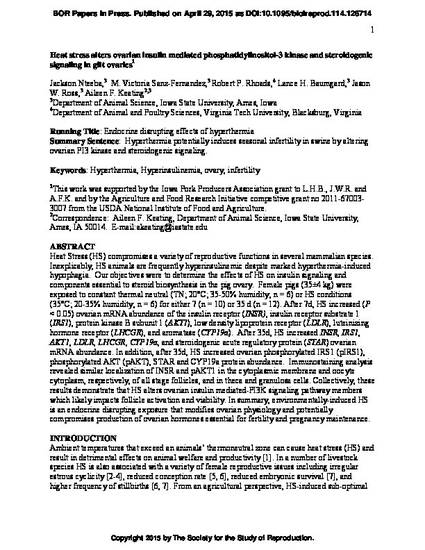
Heat Stress (HS) compromises a variety of reproductive functions in several mammalian species. Inexplicably, HS animals are frequently hyperinsulinemic despite marked hyperthermia-induced hypophagia. Our objectives were to determine the effects of HS on insulin signaling and components essential to steroid biosynthesis in the pig ovary. Female pigs (35±4 kg) were exposed to constant thermal neutral (TN; 20°C; 35-50% humidity; n = 6) or HS conditions (35°C; 20-35% humidity; n = 6) for either 7 (n = 10) or 35 d (n = 12). After 7d, HS increased (P < 0.05) ovarian mRNA abundance of the insulin receptor (INSR), insulin receptor substrate 1 (IRS1), protein kinase B subunit 1 (AKT1), low density lipoprotein receptor (LDLR), luteinizing hormone receptor (LHCGR), and aromatase (CYP19a). After 35d, HS increased INSR, IRS1, AKT1, LDLR, LHCGR, CYP19a, and steroidogenic acute regulatory protein (STAR) ovarian mRNA abundance. In addition, after 35d, HS increased ovarian phosphorylated IRS1 (pIRS1), phosphorylated AKT (pAKT), STAR and CYP19a protein abundance. Immunostaining analysis revealed similar localization of INSR and pAKT1 in the cytoplasmic membrane and oocyte cytoplasm, respectively, of all stage follicles, and in theca and granulosa cells. Collectively, these results demonstrate that HS alters ovarian insulin mediated-PI3K signaling pathway members which likely impacts follicle activation and viability. In summary, environmentally-induced HS is an endocrine disrupting exposure that modifies ovarian physiology and potentially compromises production of ovarian hormones essential for fertility and pregnancy maintenance.
Available at: http://works.bepress.com/aileen-keating/23/

This is a manuscript of an article published as Nteeba, Jackson, M. Victoria Sanz-Fernandez, Robert P. Rhoads, Lance H. Baumgard, Jason W. Ross, and Aileen F. Keating. "Heat stress alters ovarian insulin-mediated phosphatidylinositol-3 kinase and steroidogenic signaling in gilt ovaries." Biology of Reproduction 92, no. 6 (2015): 148, doi: 10.1095/biolreprod.114.126714. Posted with permission.